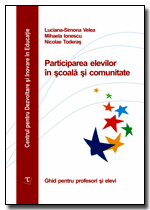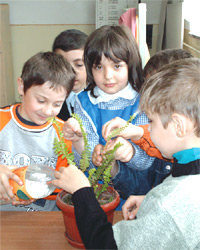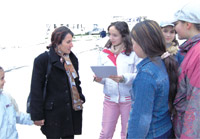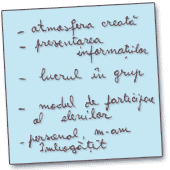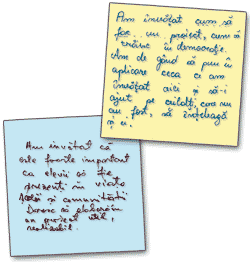Centre for Innovation in Education
 (TEHNE Romania)
(TEHNE Romania)| TEHNE.ro > projects > Students' participation: a form of living democracy |
|
Students' participation in school life: a form of living democracy
Autors: Luciana-Simona VELEA, Nicolae TODERAȘ, Mihaela IONESCU
© TEHNE - Centrul pentru Dezvoltare și Inovare în Educație
Available for download - Romanian version (1,5 Mb): Partners
Participating schools The pilot schools are located in Dolj county, in rural communities or in small towns.
Project description The project aims to support the development of student participation mechanisms and structures at school level and to offer students real opportunities to exercise the democratic participation. It also aims to enhance the school transformation towards a democratic learning environment, with a participative management, flexible curriculum offers, and a modern, democratic organizational culture, based on fundamental principlles of democracy and human rights. The target group is composed by 4 schools located in the South of Dolj county, in rural and small towns. It is very relevant for the concrete needs of rural and small towns schools, which had less opportunities to be involved in educational or social projects, less training opportunities for teachers, a limited access to information and resources. Through this project, there will be created in the pilot schools the mechanism and structures for students' participation (SP) in the school life, including school and out-of-school activities. In each pilot school a project team, that will act as the "initiative group". The project teams will be trained in order to have a broader meaning of students' participation and how it can be achieved. School inspectors and community representatives will also be trained in order to have a common understanding of students' participation (SP) and to promote the values and principles of democratic citizenship. Each pilot-school will prepare a project aiming to promote students' participation and will implement during this project. This way, the school capacities of writing and implementing projects will be developed. The school project will have 2 components: one promoting SP in the school, and one promoting SP beyond the school, in the community context. The project end is marked by the summer school that will be organized in Caciulata (Valcea). This summer camp will provide the participants to share experiences, learn from each-other, and most important to get aware of their possibilities to make a difference in their community life.The project proposes an innovative approach on SP, in a comprehensive manner: diverse forms of SP, training and involvement of different stakeholders. SP is not understood as participation in the students' councils or parliaments or other structures, but it is understood in a broader sense of participation in learning, making options for elective subjects or for curriculum topics, using interactive methods and authentic assessment, doing and implementing projects, making awareness-raising campaign, voluntary activities in the community. The project team will edit a methodological guide for students' participation. This will present the basic principles of SP, instruments, methodologies and options, benefits and also case-studies (examples of good practices). This guide will be published in 550 copies and will be distributed in schools, school inspectorates, Teachers' Training Houses, NGO's etc. The sustainability of the project is given by the school - community partnership and by the school-centred approach that means the development of a strong "action group" at the school level. The trained teachers and students will be willing to continue their learning experience once they got aware of the possibilities and benefits of such activities. The editing of the methodological guide for SP will also sustain the initiative not only in the pilot-schools but also in other schools in the country. The project will be implemented by TEHNE - Centre for Innovation and Development in Education. TEHNE will invite experts in the field of EDC to participate in the project (Ministry of Education and Research, Institute for Education Sciences).
The project aims to promote students' participation in the school life and in the community life. This means the students will be directly involved in all the activities. Teachers and community representatives act as "support partners" for students initiatives. The key-word in this project is "participation" reflected no only in theoretical approach of the necessity/ forms/ benefits of students participation, but in the very concrete ways, for example initiating school councils, students' councils, students' spokesman, civic club, organizing community-oriented events, partnership with other institutions in the community etc.The representatives of local communities and local authorities will participate both in training activities but also in the events organized by the students. Their role is to support students to exercise the skills and attitudes of participative citizenship.The local NGO's will be invited to join the project as participants in training sessions and partners in the community and school events.
Activities
Expected follow up: The methodological guide on students' participation will be distributed in schools, school inspectorates, Teachers' Training Houses, NGO's. The partnership between TEHNE and the pilot-schools will continue through offering schools technical assistance in writing project proposals and organizing activities. The partnership between schools and other institutions will be encouraged. New financing opportunities will be identified in order to multiply this experience with new partners. The structures created in schools in order to promote students' participation will be monitored after the completion of the project, to find out the long-term impact and the support of civil society development.
The project is promoting the education for democratic citizenship, participation being one strong components of this. Thus, it will be disseminated in the framework of the European Year of Citizenship through Education. |
| TEHNE.ro > projects > Students' participation: a form of living democracy |
| © Centre for Innovation and Development in Education (TEHNE Romania) |
|
|
